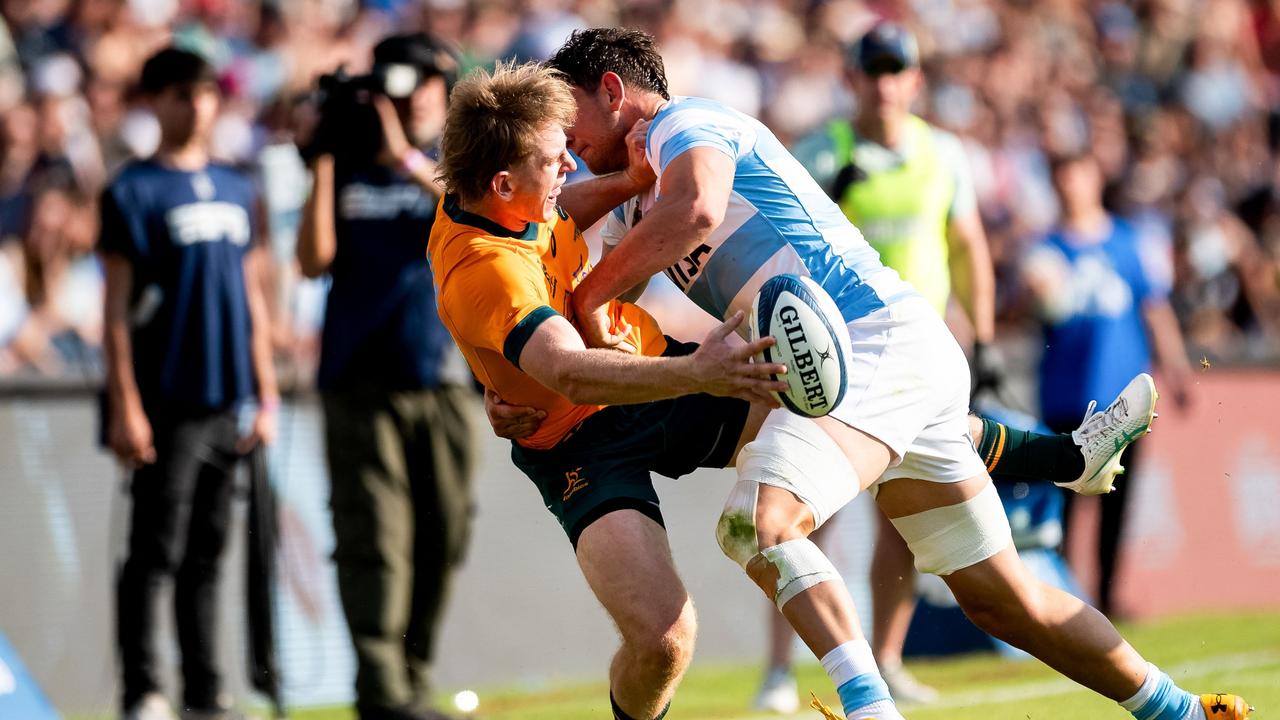The 20-hour turnaround that helped Wallabies avoid a Georgian ambush
Several major games have been ruined by red cards in recent years. Rugby Australia wants to change that, including for the Lions tour and 2027 World Cup.

Rugby
Don't miss out on the headlines from Rugby. Followed categories will be added to My News.
Frantic late-night emails saved the Wallabies from a Georgian ambush last weekend when Rugby Australia was granted a request for 20-minute red cards just 20 hours before kick-off.
As it turned out, Wallabies winger Filipo Daugunu was upgraded to a red card at the start of the second half following a sin-binning in the 36th minute after he jumped for a ball and kneed Demur Tapladze in the face.
Had RA not been granted the 20-minute red card trial by World Rugby last Friday night, the Wallabies would have had to play the entire second half with 14 men.
Given the final score was 40-29 and Georgia was storming back late, Joe Schmidt’s unbeaten start as coach could well have turned into a disaster.
“It took a lot of lobbying and when Daugunu got the red card I was very thankful we lobbied as hard as we did,” RA chief executive Phil Waugh said.
“Thankfully the Georgians were receptive to the 20-minute red card, which meant they were supportive of that modification.
“We had some challenges given the lateness for the clarity of playing on Saturday, so we continued to work with World Rugby to get the appropriate sanction to play it.”

RA had attempted to get the 20-minute red card during the first two Tests against Wales but faced resistance from the northern team.
Coincidentally, South Africa played later on Saturday against Portugal without the 20-minute red card.
Its centre Andre Esterhuizen was sin-binned in just the third minute and it was upgraded to red, which meant the Boks played the rest of the game with 14 men.
They still won 64-21 but Esterhuizen has been suspended for three games.
Daugunu will miss two Queensland club rugby games and be available for the opening Rugby Championship match against South Africa in Brisbane on August 10.

Despite the fact it worked against his team, Georgia’s coach Richard Cockerill supported the 20-minute red card.
“I think it’s a good thing because did the Aussie player mean to do it? Probably not,” Cockerill said. “So it’s a bit clumsy but it doesn’t completely ruin the game.”
We are now left with a situation in which southern hemisphere teams support introducing the 20-minute red card for all Tests but northern hemisphere teams remain opposed.
The 20-minute red card is set to be used again throughout TRC but RA’s hope is that it may be introduced worldwide for all Tests, including the British & Irish Lions tour next year and 2027 World Cup.
“That’s our intent,” Waugh said. “I think it’s a good outcome for the game and we need to keep progressing.”
The 2021 women’s World Cup final and 2023 men’s World Cup final were marred by send-offs.
In 2021, England led New Zealand 14-0 before its winger Lydia Thompson was sent off for making head contact with rival Portia Woodman in just the 18th minute. The Kiwis went on to win the decider 34-31.
Last year, All Blacks captain Sam Cane was the first man sent off in a World Cup final when he was red-carded in just the 29th minute for a high shot on South African centre Jesse Kriel that came after a review from television match official Tom Foley.
The Kiwis fought back late in the game but couldn’t overcome the numerical disadvantage and lost 12-11.


“As we’ve seen before, whether it was the 2011 semi-final with Sam Warburton (sent off in the 18th minute against France) or the World Cup finals in both the men’s and women’s in the last two with Sam Cane and Lydia Thompson, there are games where maybe the outcome would have been the same but it just takes the commentary away from the send-off and puts all the commentary on the actual game,” Waugh said.
“It’s the right outcome for the game. It’s progressive while also keeping the players’ safety front and centre.
“We’ve been working really constructively with World Rugby and we understand the challenges around this 20-minute red card.
“But given it’s become the norm within Super Rugby Pacific and within the south, we wanted to play it in the Welsh series.
“Given there is some hesitation within the Six Nations, we were unable to get it through for the Welsh games.
“The Georgians were accommodating and understood the benefit of it. Then it was a matter of working with World Rugby, which we did, and kept pushing hard to get to the outcome, which I think was the right outcome for the game.
“We were without a player for 20 minutes but it allowed us to bring on a player to replace Filipo Daugunu and I think it was a better outcome for the jeopardy of the game.”
Waugh said it was now very rare to see deliberate swinging arms or intent to injure players, which furthered the case for accidental incidents not to be punished the same way.

“The integrity of the game and the deliberate nature of foul play from what I’ve seen is pretty much non-existent now,” Waugh said.
“A lot of it is accidental, bad timing, someone may slip and make head contact.
“We need to continue to protect our players and make sure it’s a safe game to play but at the same time I think the behaviour of players has changed considerably over many years, to the point where nearly all head contact is accidental.
“We have red cards to protect the heads of players but given the accidental nature of a lot of those incidents, we want to ensure the jeopardy is kept in the game.
“The 20-minute red card is fair for both teams and when you think about fan engagement I think it’s the most sensible outcome for fans as well because they know that the outcome is unknown given for the majority of the game you have 15 on 15.”
More Coverage
Originally published as The 20-hour turnaround that helped Wallabies avoid a Georgian ambush





